
The word “lovely” is old-fashioned and antiquated. Still, I consider it an old stand-by when referring to poems that successfully dance on the edge of abstraction and sentiment.
Abstraction and sentiment, you see, live on the precipice. One false move and over they go, much like Wiley Coyote with his lead parachute manufactured by Acme. My hat’s off, then, to poets who take risks, and one who engaged in risky business early and often is Mark Strand. As a for instance, let’s read together:
The Night, the Porch
Mark Strand
To stare at nothing is to learn by heart
What all of us will be swept into, and baring oneself
To the wind is feeling the ungraspable somewhere close by.
Trees can sway or be still. Day or night can be what they wish.
What we desire, more than a season or weather, is the comfort
Of being strangers, at least to ourselves. This is the crux
Of the matter, which is why even now we seem to be waiting
For something whose appearance would be its vanishing —
The sound, say, of a few leaves falling, or just one leaf,
Or less. There is no end to what we can learn. The book out there
Tells us as much, and was never written with us in mind.
If poetry is the art of stating truths we hold to be self-evident — only in a manner we’ve never seen before — then Strand is your man. For a dark poem, “The Night, the Porch” is deceptively light.
For starters we have that “nothing” in L1, the one we learn by heart by staring at. It’s the same nothing we’re all being swept into, according to the speaker, once our brief terms here are done.
What really gets me is the “crux / Of the matter,” defined here as “the comfort / Of being strangers, at least to ourselves.” I had to mull on that one for awhile. How is there any comfort in being a stranger to yourself? But then I recalled the words of the prophets: “But I still haven’t found what I’m looking for” (St. Bono) and “The mass of men lead lives of quiet desperation” (St. Henry David). Surely that “stranger” is the construct we always hoped we would be.
And so we wait. And wait. For something as subtle as the sound of leaf fall. For something “whose appearance would be its vanishing,” which is a roundabout way of saying something both impossible and impossibly lovely.
Why is the impossible so alluring, you ask? Perhaps it is akin to hope. Perhaps it is one of the things that keeps us going in life. At the end of his book, The Sun Also Rises, Ernest Hemingway has Brett Ashley and Jake Barnes — lovers doomed to never love — look each other in the eye and agree on this sentiment: “Isn’t it pretty to think so?”
Yes, it is, no matter what “it” is. And acknowledging as much is like learning from a book that was “never written with us in mind.”
We just think it was, as is our prerogative.




